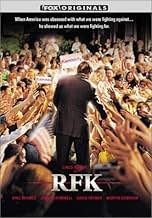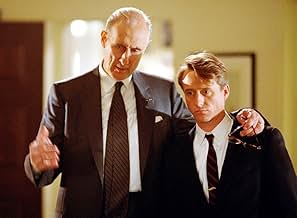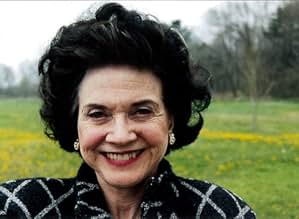IMDb-BEWERTUNG
6,3/10
464
IHRE BEWERTUNG
Füge eine Handlung in deiner Sprache hinzuFollowing the death of his brother John, Robert Kennedy is forced to rise to the challenge of leading his country and carrying on his brother's vision of what America could be.Following the death of his brother John, Robert Kennedy is forced to rise to the challenge of leading his country and carrying on his brother's vision of what America could be.Following the death of his brother John, Robert Kennedy is forced to rise to the challenge of leading his country and carrying on his brother's vision of what America could be.
- Auszeichnungen
- 1 Nominierung insgesamt
Empfohlene Bewertungen
An interesting character study that could've done so much more, but ends up kind of having tunnel vision. Linus Roache's portrayal of RFK as the mourning brother becoming his own man is well done, but the script doesn't do enough justice to the levels of complexities surrounding his grief and ultimately his becoming a champion of the minorities and the downtrodden. Every issue seems the same repetitive cycle. First there is a call to action by RFK's advisers -- who are generally indistinguishable and more or less interchangeable, in that there is little character development on anyone's part outside of RFK himself. Then Bobby dithers on whether he should take a stand in a "damned if I do, damned if I don't" way. At some point Jack's ghostly presence chastises him. And after another scene of Bobby interacting with the people, he suddenly decides to make the decision that had always been suggested TO him. Wash, rinse, repeat. You get the feeling that Bobby doesn't so much come off as a man of strength of forming his own convictions, but one of a wild pet that has to be trained to think like a politician. Perhaps that was the point; I'm not sure.
That being said, if that were the film's only flaw, I'd have probably been okay with it. The problem is, it seems to gloss over everything in his life that isn't his political career. As mentioned before, there is little to no character development outside of RFK himself. His wife, Ethel, comes off as glib and shallow -- and no mention is made of the fact that she was probably pregnant through half the time period the film takes place; Bobby and Ethel Kennedy had 11 children (one was born after his death), and other than a shot of two or three of them from afar once or twice, little mention is made that they are even parents. (Not to mention that he became sort of a surrogate father to JFK's kids, as well.) Shouldn't they at least be seen around the house more, or on the campaign trail with him? The film would have also done well to focus more around events and actions, and less around time spent in RFK's own headspace. One of the other reviewers mentioned the 1964 Democratic Convention, where people stood and cheered for him for over 20 minutes before he could speak -- the cheering overwhelmingly, of course, being for his brother's memory and not for RFK himself. I agree. Instead of Bobby simply saying those things after nondescript events, show it. Or the fact that RFK so soon declared his candidacy for the Presidency after Eugene McCarthy won the New Hampshire primary (they only mention beforehand that he's running); the movie makes it seem like he arbitrarily came to the decision. Showing just how much he had to catch up, the time frame we're talking about, would've added a whole new level of complexity to his character -- how sometimes historical events WERE what forced him to make a decision, but he rose to the occasion above them.
Lastly, this film also suffers because people really have to know their history to understand what's going on. This is the first film I've ever seen where the uneducated viewer has to pay attention to the opening credits to get a sense of context, since the film opens with JFK's assassination. Names and events were thrown around as though everyone knew exactly what or who they were and why they were important; if one didn't know that RFK worked for Joseph McCarthy or prosecuted the Teamsters' Union, it might be hard to pick up through their rapid-fire conversation; the film sort of throws the viewers into this universe and forces them to work backward. A flashback or two, or an extra scene or two before JFK planned to go to Dallas illustrating better the kind of man Bobby was before November 22, 1963, and the kind of bond the brothers shared would've made the rest of the film more powerful. Instead, it's all idle chatter.
It wasn't a bad film, and the concept worked; it just could've executed it better in so many ways by slightly expanding its scope and glossing over what seems important.
That being said, if that were the film's only flaw, I'd have probably been okay with it. The problem is, it seems to gloss over everything in his life that isn't his political career. As mentioned before, there is little to no character development outside of RFK himself. His wife, Ethel, comes off as glib and shallow -- and no mention is made of the fact that she was probably pregnant through half the time period the film takes place; Bobby and Ethel Kennedy had 11 children (one was born after his death), and other than a shot of two or three of them from afar once or twice, little mention is made that they are even parents. (Not to mention that he became sort of a surrogate father to JFK's kids, as well.) Shouldn't they at least be seen around the house more, or on the campaign trail with him? The film would have also done well to focus more around events and actions, and less around time spent in RFK's own headspace. One of the other reviewers mentioned the 1964 Democratic Convention, where people stood and cheered for him for over 20 minutes before he could speak -- the cheering overwhelmingly, of course, being for his brother's memory and not for RFK himself. I agree. Instead of Bobby simply saying those things after nondescript events, show it. Or the fact that RFK so soon declared his candidacy for the Presidency after Eugene McCarthy won the New Hampshire primary (they only mention beforehand that he's running); the movie makes it seem like he arbitrarily came to the decision. Showing just how much he had to catch up, the time frame we're talking about, would've added a whole new level of complexity to his character -- how sometimes historical events WERE what forced him to make a decision, but he rose to the occasion above them.
Lastly, this film also suffers because people really have to know their history to understand what's going on. This is the first film I've ever seen where the uneducated viewer has to pay attention to the opening credits to get a sense of context, since the film opens with JFK's assassination. Names and events were thrown around as though everyone knew exactly what or who they were and why they were important; if one didn't know that RFK worked for Joseph McCarthy or prosecuted the Teamsters' Union, it might be hard to pick up through their rapid-fire conversation; the film sort of throws the viewers into this universe and forces them to work backward. A flashback or two, or an extra scene or two before JFK planned to go to Dallas illustrating better the kind of man Bobby was before November 22, 1963, and the kind of bond the brothers shared would've made the rest of the film more powerful. Instead, it's all idle chatter.
It wasn't a bad film, and the concept worked; it just could've executed it better in so many ways by slightly expanding its scope and glossing over what seems important.
The only thing this TV-movie did better than the 1985 mini-series "Robert Kennedy & His Times" was the casting of Lyndon Johnson, though neither actor was remotely like the real man in manner, speech or action.
These two docudramas cover virtually the same identical territory, though the 1985 one does it in 6 hours, and thus can go into much greater detail. I happened to watch them back-to-back (the 1985 mini-series is airing on the Starz TrueStories channel this month) and the mini-series is far better at getting into the mind of RFK--especially without ghostly pronouncements by his brother. Too bad the actor playing Johnson is so jarring, because most of the other casting is quite wonderful, especially Beatrice Straight as Rose and Veronica Cartwright as Ethel Kennedy. The blending of actual footage and newly shot footage is seamless and effective. The locations (Hickory Hill and Hyannisport) look far more like the real places than in the 2002 FX production.
The casting of RFK and JFK is always problematic and neither of these productions does terribly well. At least not for those of us who remember the real men. But for those who want to know of these events, they are adequate. It's not the actors' faults. The Kennedy brothers were so visible, memorable and distinctive that unless you're both a great actor and a virtual lookalike, no one can do it.
These two docudramas cover virtually the same identical territory, though the 1985 one does it in 6 hours, and thus can go into much greater detail. I happened to watch them back-to-back (the 1985 mini-series is airing on the Starz TrueStories channel this month) and the mini-series is far better at getting into the mind of RFK--especially without ghostly pronouncements by his brother. Too bad the actor playing Johnson is so jarring, because most of the other casting is quite wonderful, especially Beatrice Straight as Rose and Veronica Cartwright as Ethel Kennedy. The blending of actual footage and newly shot footage is seamless and effective. The locations (Hickory Hill and Hyannisport) look far more like the real places than in the 2002 FX production.
The casting of RFK and JFK is always problematic and neither of these productions does terribly well. At least not for those of us who remember the real men. But for those who want to know of these events, they are adequate. It's not the actors' faults. The Kennedy brothers were so visible, memorable and distinctive that unless you're both a great actor and a virtual lookalike, no one can do it.
I have for many years now felt that Robert F Kennedy was the greatest of the 4 Kennedy Brothers. This movie did nothing to change that but did give the view that RFK was very much haunted by the memory of his brother John.
While John was driven mostly by his father's desire to see one of his son's achieve greatness by becoming President of the United States. Robert seems almost reluctant to take up that torch and according to this story does so only when he realizes that the only way he can do the things he believes need to be done for the his country is by winning the Oval Office.
Roache does a marvelous job of looking and sounding like RFK. James Cromwell does a good job as LBJ. He is a fine actor just doesn't seem as over the top as the real LBJ was. David Paymer is his usual best and Ving Rhames is excellent in a somewhat small but important part as "Judge Jones".
The movie takes place between the Assassinations of John and Robert. It shows how Bobby goes from concerned to actually caring.
There's some good 60's music in it but you don't notice it a lot.
I'm writing this on Aug 25, 2002. The movie will be re-run next Wed. It's worth your time. At a time when we last had two men who were most interested in being President regardless of whether or not he'd won the election....this movie will make you wonder why we can't have men and women of great ideals and political courage today. Yes my friends there truly was a time when if someone was running for office and said he intended to help poor people he meant it and was held to his promise. If you know little about Robert Kennedy then prepare to be impressed by a great man.
While John was driven mostly by his father's desire to see one of his son's achieve greatness by becoming President of the United States. Robert seems almost reluctant to take up that torch and according to this story does so only when he realizes that the only way he can do the things he believes need to be done for the his country is by winning the Oval Office.
Roache does a marvelous job of looking and sounding like RFK. James Cromwell does a good job as LBJ. He is a fine actor just doesn't seem as over the top as the real LBJ was. David Paymer is his usual best and Ving Rhames is excellent in a somewhat small but important part as "Judge Jones".
The movie takes place between the Assassinations of John and Robert. It shows how Bobby goes from concerned to actually caring.
There's some good 60's music in it but you don't notice it a lot.
I'm writing this on Aug 25, 2002. The movie will be re-run next Wed. It's worth your time. At a time when we last had two men who were most interested in being President regardless of whether or not he'd won the election....this movie will make you wonder why we can't have men and women of great ideals and political courage today. Yes my friends there truly was a time when if someone was running for office and said he intended to help poor people he meant it and was held to his promise. If you know little about Robert Kennedy then prepare to be impressed by a great man.
A whole lot better than most made-for-TV projects. This bio-pic focuses on the life of Robert Kennedy as Senator and Presidential candidate. The story line covers a time span from the 1963 assassination of brother President John F. Kennedy to RFK's own assassination by a mad gunman on the 1968 Presidential campaign trail. The old newsreel footage and current footage could have been blended a lot better. The whole presentation is pretty bland compared to the high energy JFK by Oliver Stone. Linus Roache worked hard on getting down Bobby's mannerisms, but falls short on duplicating that Kennedy accent. James Cromwell does a remarkable portrayal of Lyndon B. Johnson. Also in the cast are: Ving Rhames, Sergio Di Zio and Marnie McPhail. Not so impressive is the numberous scenes of Robert talking to the ghost of his dead brother John played poorly by Martin Donovan. The essence of RFK's vision for a new and better America is there. Politically inclined or not, it is worth your while to watch this version of history.
As someone who grew up in the 1960s, remembers Robert F. Kennedy and admires the things he stood for, I looked forward to FX's "RFK" only to be thoroughly disappointed. While the lead actor was acceptable in his portrayal, the script itself was disappointing and shallow. It may be asking too much to expect a two-hour production (minus commercials) to do justice to the life of an extraordinary man. But if someone attempts to do precisely that, he needs to narrow his focus better. None of the major events received the in-depth attention they deserved, and some important events were overlooked entirely. Kennedy's speech to the Democratic National Convention less than a year after his brother's assassination was a poignant and extremely significant moment in his life and career, yet it received no attention in the film. With JFK's ghostly presence occupying such an important role in the film, shouldn't this event have been included -- even if it meant deleting an obviously fictitious event, like the scene in which Bobby leaps into the water to rescue his brother's jacket? Young viewers who want to learn more about this great American should not waste their time watching this film. There are better options out there!
Wusstest du schon
- WissenswertesThis marks the second time David Paymer is involved in a film where Richard Goodwin is a major character. While in this film he plays Goodwin (RFK speech-writer) Paymer interacts with lawyer/congress investigator Goodwin in Quiz Show (1994), this time played by Rob Morrow.
- Zitate
President Lyndon Baines Johnson: Even so, I gotta have you inside the tent pissin' out than outside pissin' in.
- VerbindungenFeatured in The 60th Annual Golden Globe Awards (2003)
Top-Auswahl
Melde dich zum Bewerten an und greife auf die Watchlist für personalisierte Empfehlungen zu.
Details
Zu dieser Seite beitragen
Bearbeitung vorschlagen oder fehlenden Inhalt hinzufügen

Oberste Lücke
By what name was RFK: Ein Kennedy gibt nicht auf (2002) officially released in Canada in English?
Antwort




























